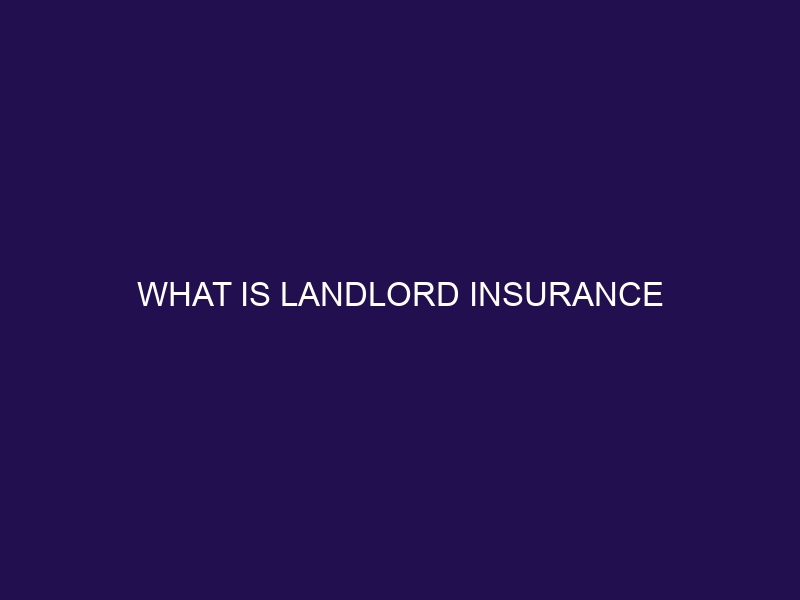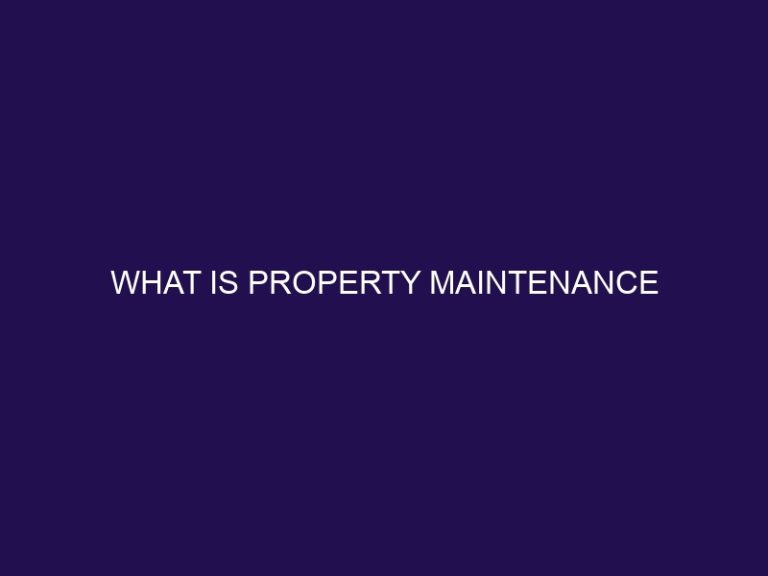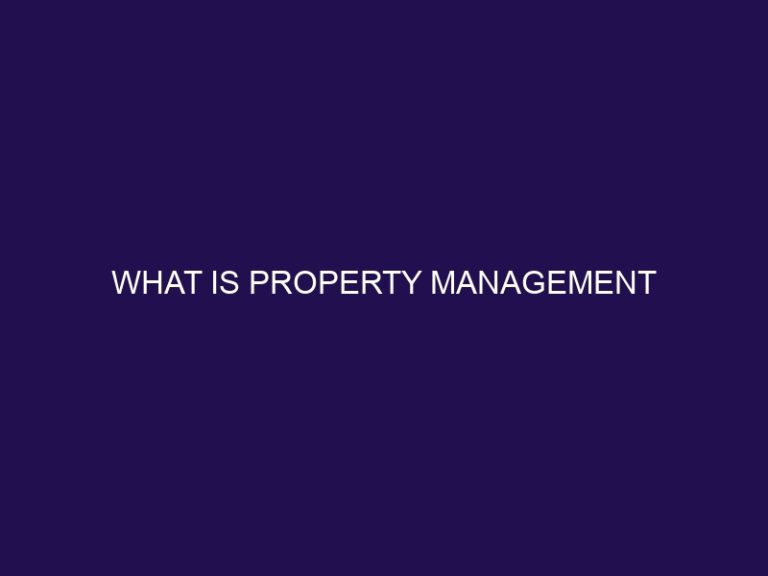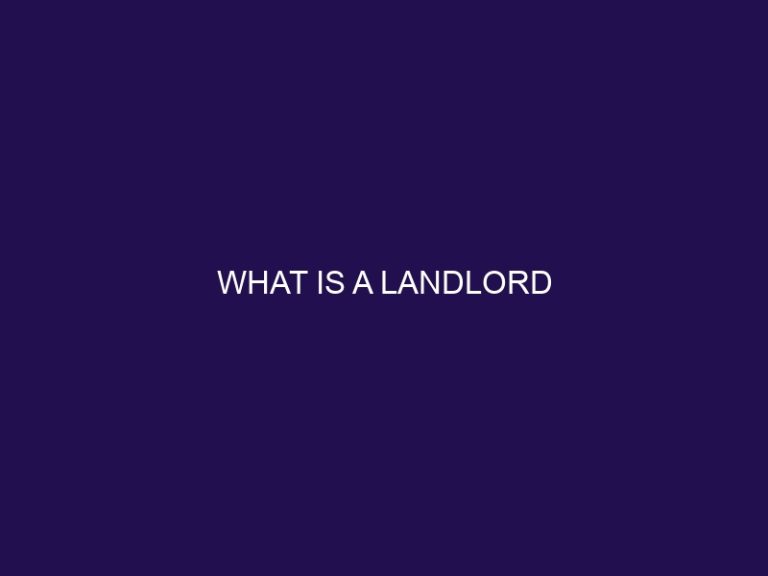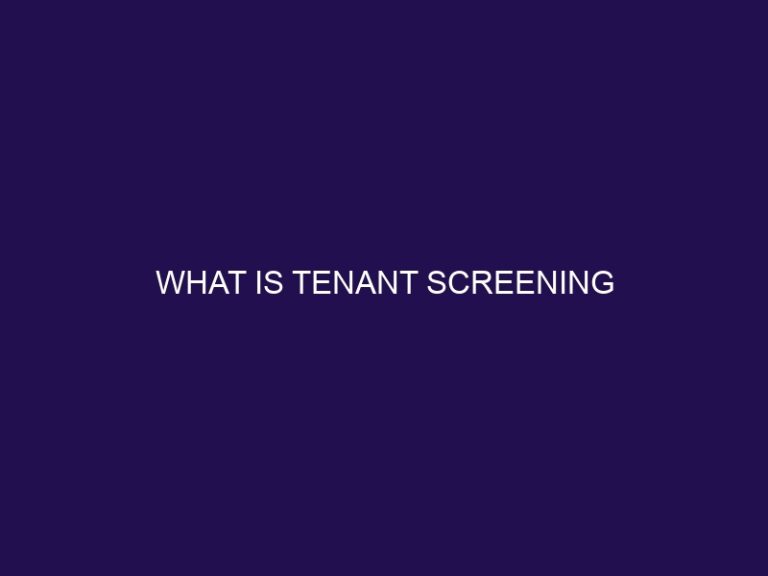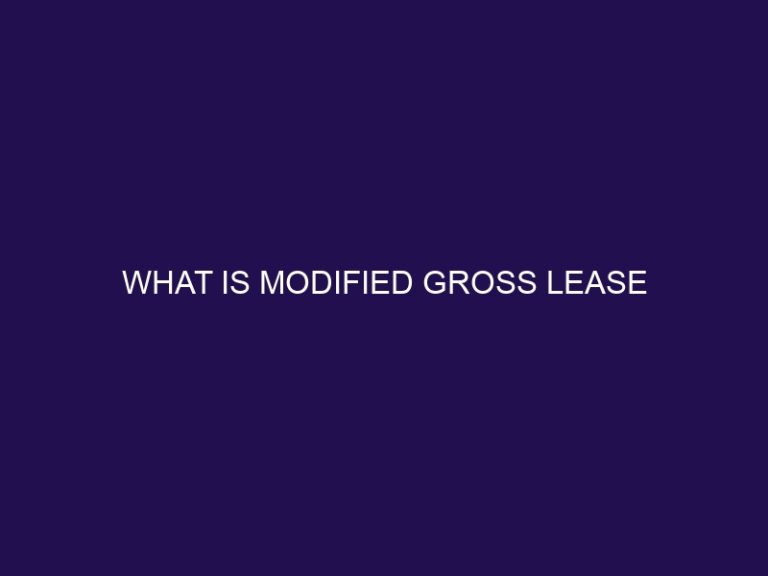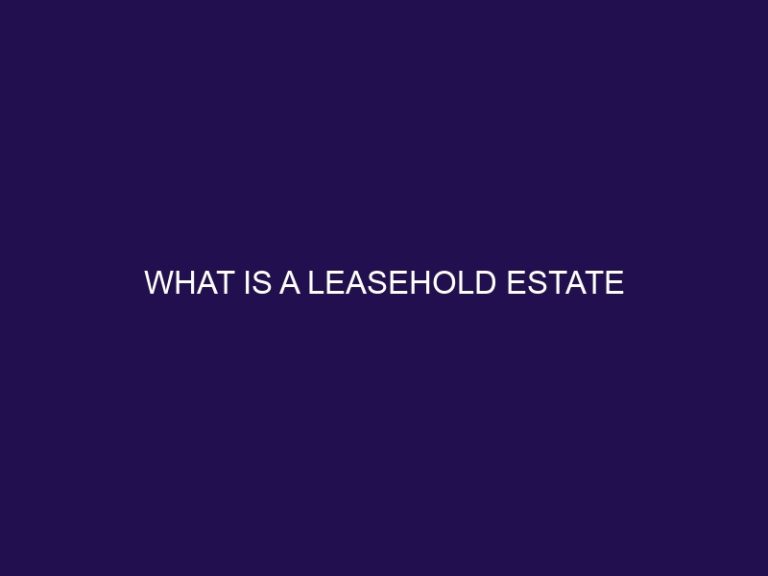What is Landlord Insurance
Landlord insurance is a specialized type of insurance that provides coverage for property owners who rent out their properties. It offers financial protection against various risks and liabilities associated with rental properties. Understanding the specifics of landlord insurance is essential for property owners to safeguard their investments.
So, what exactly is landlord insurance? Landlord insurance is a policy designed to protect property owners from financial losses due to damages to the property, liability claims from tenants or third parties, and loss of rental income. It provides coverage for a range of potential incidents, including property damage, personal injury claims, and loss of rental income due to property unavailability.
The coverage provided by landlord insurance varies depending on the policy, but generally, it includes three main components: property damage coverage, liability coverage, and loss of rental income coverage.
1. Property Damage Coverage: This component of landlord insurance protects against damages caused by perils such as fire, vandalism, or severe weather. It typically covers the physical structure of the property, as well as any owned personal property within the premises, such as appliances or furniture.
2. Liability Coverage: Liability coverage protects property owners from legal claims and expenses if a tenant, visitor, or third party suffers an injury or property damage on the rental property. It covers legal defense costs and any resulting liability judgments or settlements.
3. Loss of Rental Income Coverage: If a covered event makes the rental property uninhabitable, this coverage provides reimbursement for the lost rental income during the necessary repairs or renovations.
While landlord insurance is not legally required in many places, it is highly recommended for property owners. It is crucial for those who are renting out a property to protect their investment and mitigate potential financial risks.
There are several benefits of having landlord insurance. It provides property damage protection, ensuring that damages to the property are covered. It also offers legal liability coverage, protecting landlords from legal claims and expenses. It provides protection against the loss of rental income, which can be beneficial in cases where the property becomes uninhabitable due to covered events.
When choosing the right landlord insurance, it is essential to assess the specific needs of the property, compare policy coverages and exclusions, and evaluate different insurance providers. This will ensure that the chosen insurance policy adequately covers the property and meets the landlord’s specific requirements.
The cost of landlord insurance varies based on various factors, including the location and value of the property, the coverage limits, and the deductible. It is important to consider the cost of insurance when budgeting for the property’s expenses.
Lastly, it is worth noting that there are other types of insurance that landlords may consider, such as umbrella insurance for additional liability coverage and flood insurance if the property is located in a flood-prone area.
By understanding what landlord insurance is, its coverage components, and the benefits it offers, property owners can make informed decisions to protect their rental properties and financial interests.
Understanding Landlord Insurance
Understanding landlord insurance is crucial for property owners who rent out their properties. Here are some key points to consider:
- Coverage: Landlord insurance offers protection for property damage, liability, and loss of rental income.
- Property damage: This type of insurance covers the cost of repairs or replacement resulting from events such as fire, vandalism, or natural disasters.
- Liability: Landlord insurance safeguards against lawsuits filed by tenants or individuals who sustain injuries on the property.
- Loss of rental income: In the event that the property becomes uninhabitable due to a covered incident, landlord insurance compensates for the lost rental income.
- Additional coverage options: Landlords also have the option to enhance their policy by adding endorsements that provide coverage for specific risks, such as water damage or incidents related to pets.
What is Landlord Insurance?
What is Landlord Insurance? is a specialized insurance policy tailored to the needs of landlords. Its purpose is to provide protection for rental properties, safeguarding landlords from various risks. This comprehensive coverage encompasses property damage, liability claims, and the loss of rental income. Landlord insurance typically includes both building insurance, which safeguards the structure of the property, and contents insurance for furnished or equipped items within the rental unit. In addition, it may also offer coverage for legal expenses and eviction costs. It is crucial for property owners who rent out their properties to have landlord insurance as it ensures their investment is safeguarded and provides financial security against potential risks.
What Does Landlord Insurance Cover?
Discover what exactly is covered by landlord insurance in this comprehensive section. From property damage coverage to liability coverage and loss of rental income coverage, we’ll dive into each sub-section to provide you with clarity on the extent of protection that this type of insurance offers. Uncover the facts, figures, and events that highlight the importance of landlord insurance and the peace of mind it can bring to property owners.
1. Property Damage Coverage
Property Damage Coverage is an essential element of landlord insurance as it provides necessary protection against any potential damage to the property. It is vital for property owners to consider the following key points:
- Structural damage: Landlord insurance covers the costs of repairing or replacing the building structure in case of unforeseen events like fires, storms, or vandalism.
- Contents damage: This coverage ensures that any damage to the furnishings or appliances provided by the landlord is also included.
- Loss of rent: In the unfortunate event that the property becomes uninhabitable due to covered damage, landlord insurance can reimburse the lost rental income during the repair period.
- Additional expenses: Landlord insurance may also cover any additional expenses incurred during the repair process, such as providing temporary accommodations for tenants or alternative storage solutions.
- Exclusions: It is crucial to be aware of any exclusions or limitations specified within the insurance policy, such as damage caused by tenants, regular wear and tear, or certain natural disasters.
Property Damage Coverage provides property owners with financial protection and peace of mind as it constitutes a vital component of landlord insurance.
2. Liability Coverage
Liability coverage is a crucial component of landlord insurance, providing protection for landlords against legal claims that may arise from injuries or damages associated with the property. It is important to consider several key aspects when choosing liability coverage:
| – Property Maintenance: | Ensuring a safe environment is maintained to minimize the risk of accidents or injuries. |
|---|---|
| – Legal Expenses: | Typically, liability coverage includes coverage for legal fees and settlements if legal action is taken against you. |
| – Personal Liability: | Along with protecting the property itself, it is crucial to safeguard yourself from claims made by tenants, visitors, or third parties who might sustain injuries on your property. |
Having adequate liability coverage is essential in safeguarding your investment and providing peace of mind. To ensure the right level of coverage, it is advisable to carefully review policy details and consult with insurance providers to explore customized options.
3. Loss of Rental Income Coverage
Loss of rental income coverage is a crucial aspect of landlord insurance that safeguards landlords in the event that their rental property becomes uninhabitable and they are unable to collect rent.
- Protection against unexpected events: Loss of rental income coverage provides essential financial protection if a tenant is compelled to vacate the property due to covered events such as a fire or natural disaster.
- Income reimbursement: By having this coverage, landlords can be reimbursed for the lost rental income during the period when the property is uninhabitable and undergoing repairs.
- Temporary accommodation expenses: Moreover, certain policies also cover the expenses of providing temporary accommodation for tenants while repairs are being carried out, ensuring that they have a place to stay.
A true story: In 2021, a landlord in California encountered loss of rental income when their property was damaged by a severe storm. Fortunately, thanks to their landlord insurance policy’s loss of rental income coverage, they received reimbursement for the lost rent and were able to handle repair costs without enduring financial hardship.
Do You Need Landlord Insurance?
Are you a landlord wondering if you need insurance? Let’s explore the importance of having landlord insurance by diving into two key areas. First, we’ll discuss renting out a property and the potential risks involved. Then, we’ll delve into protecting your investment and why insurance plays a vital role. So, if you’re eager to safeguard your financial interests and gain peace of mind as a landlord, read on for valuable insights and expert advice.
1. Renting Out a Property
When renting out a property, it’s crucial to follow a set of steps to guarantee a smooth and successful process.
- Prepare the property: Clean, repair, and stage the property to attract potential tenants.
- Set a competitive rent: Conduct research on the rental market to establish a fair and competitive rental price.
- Create a comprehensive rental agreement: Clearly outline the terms, conditions, and expectations for both parties.
- Screen potential tenants: Carry out background and credit checks to ensure reliable and responsible tenants.
- Collect a security deposit: Safeguard your property by collecting a security deposit that can be utilized for repairs or damages.
Fact: As per a study, the rental market is projected to grow by 7% annually over the next five years.
2. Protecting Your Investment
- Protecting Your Investment: Follow these steps to safeguard your investment as a landlord.
- Secure Landlord Insurance: Purchase a comprehensive landlord insurance policy that adequately covers property damage, liability, and loss of rental income.
- Choose Adequate Coverage: Ensure that your insurance policy provides protection for your property and rental income.
- Regularly Inspect the Property: Conduct regular inspections to identify any maintenance or safety issues that could impact your investment.
- Screen Potential Tenants: Reduce the risk of property damage or missed rental payments by conducting thorough background and credit checks on prospective tenants.
- Create a Comprehensive Lease Agreement: Include provisions in the lease agreement that protect your investment, such as restrictions on pet ownership or smoking, and clearly outline tenant responsibilities.
Pro-tip: Maintaining open lines of communication with your tenants is essential to promptly address any concerns and foster a positive landlord-tenant relationship.
Benefits of Landlord Insurance
Discover the incredible advantages that come with having landlord insurance. From protecting your property against damages to safeguarding your income, this section takes a closer look at the benefits you can enjoy. Whether it’s ensuring legal liability coverage or providing a safety net for loss of rental income, landlord insurance offers the peace of mind every property owner deserves. Don’t miss out on exploring the key reasons why landlord insurance is a smart choice for any real estate investor.
1. Property Damage Protection
Property damage protection is an essential aspect of landlord insurance. This coverage enables landlords to protect their investment properties from a wide range of damages. These damages may include fire, storms, vandalism, or theft. Landlord insurance policies typically include coverage for the physical structure of the property as well as any additional structures such as sheds or garages. Moreover, it can also provide coverage for appliances, fixtures, and other contents within the property. In the unfortunate event of a covered loss, this insurance can assist landlords in repairing or replacing damaged items and ensuring the restoration of their rental property to its original condition.
2. Legal Liability Coverage
Legal liability coverage is a critical component of landlord insurance. It safeguards landlords from potential lawsuits arising from injuries or property damage suffered by tenants or third parties. This coverage aids in legal expenses, settlements, or judgments resulting from such claims. It also provides protection if tenants’ actions cause harm to others, such as if a dog bites a visitor. Having this coverage is essential to mitigate financial risks for landlords. It ensures that they are protected in situations where they may be held legally responsible for accidents or damages that occur on their rental property.
| Legal Liability Coverage | Protection from lawsuits due to tenant or third-party injuries or property damage |
3. Protection against Loss of Rental Income
Protection against loss of rental income is a fundamental component of landlord insurance. This type of coverage is essential for landlords as it safeguards their income in the event that their rental property becomes uninhabitable due to covered incidents such as fire, flood, or vandalism. Here are a few important factors to consider:
1. Coverage limits: It is crucial to ensure that your insurance policy offers sufficient coverage to compensate for the lost rental income while your property is being repaired or rebuilt.
2. Waiting period: It is important to understand if there is a waiting period before your insurance coverage kicks in and starts reimbursing you for the lost rental income.
3. Coverage duration: You should determine the duration for which your policy will provide coverage for the loss of rental income. Typically, this period ranges from a few months to a year.
4. Exclusions: Take the time to carefully review any exclusions or limitations that may have an impact on your ability to make a claim for lost rental income.
Remember, each insurance provider and policy may offer different terms and conditions, so it is essential to compare your options thoroughly to find the best protection for your rental income.
How to Choose the Right Landlord Insurance?
When it comes to finding the right landlord insurance, there are a few key steps you need to take. In this section, we’ll walk you through the process by discussing how to assess your property’s needs, compare policy coverages and exclusions, and evaluate insurance providers. By the end, you’ll have the knowledge and insights necessary to make an informed decision and protect your investment property. Let’s dive in and ensure you have the right coverage in place.
1. Assessing Your Property’s Needs
- Evaluate the value of your property and its contents to assess your property’s needs for landlord insurance.
- Consider the location and potential risks associated with the property, such as natural disasters or high crime rates, when assessing your property’s needs. This will help you determine if additional coverage, like flood insurance, is necessary.
- Assess the liability risks associated with your property, such as injuries to tenants or damage to neighboring properties, when determining your property’s needs for landlord insurance.
- Determine the level of rental income you depend on and consider coverage for loss of rental income in case your property becomes uninhabitable when assessing your property’s needs for landlord insurance.
- Take into account any unique features of your property that may require additional coverage, such as swimming pools or high-value assets, when assessing your property’s needs for landlord insurance.
A landlord in a coastal area assessed their property’s needs by following these steps and opted for comprehensive landlord insurance that included coverage for flood damage. When a major storm hit, their property was severely impacted by flooding. Thanks to their insurance, they were able to quickly repair the damage and continue receiving rental income during the repair period. Assessing their property’s needs beforehand saved them from significant financial losses.
2. Comparing Policy Coverages and Exclusions
When it comes to comparing policy coverages and exclusions for landlord insurance, it is crucial to carefully evaluate various insurance providers and assess the specific needs of your property. Here is a breakdown of factors that you should consider:
– Coverage options: Take the time to compare policies and make sure they adequately cover property damage, liability, and loss of rental income.
– Exclusions: It is important to look out for any specific exclusions that could potentially impact your coverage, such as certain types of property damage or incidents.
– Policy limits: You need to determine the maximum amount that the policy will pay for covered claims.
– Deductibles: Take the time to evaluate the deductibles for each policy, as higher deductibles might result in lower premiums. For more information on landlord insurance, check out What is Landlord Insurance.
– Additional benefits: Some policies may provide added benefits, such as legal assistance or emergency repair services.
By carefully considering these factors, you can select the landlord insurance policy that best suits your needs and provides comprehensive coverage. And to ensure that you fully understand the terms and conditions of your policy, it is advisable to consult with an insurance professional.
3. Evaluating Insurance Providers
Evaluating insurance providers is an essential step in selecting the appropriate landlord insurance. When evaluating insurance providers, there are several factors to consider:
| 1. Reputation: It is crucial to research the reputation of insurance providers by reading reviews and checking their ratings with consumer protection agencies. |
| 2. Financial Stability: Look for insurance companies that have strong financial stability to ensure they can fulfill claims and provide reliable coverage. |
| 3. Coverage Options: Evaluate the range of coverage options offered by insurance providers, including property damage, liability, and loss of rental income coverage. |
| 4. Claims Process: Consider the efficiency and customer service provided during the claims process. Look for insurance providers with a streamlined and responsive claims system. |
| 5. Premiums and Deductibles: To find the most competitive and cost-effective options, compare premiums and deductibles from different insurance providers. |
When evaluating insurance providers, take the time to gather all the necessary information to make an informed decision that meets your specific needs as a landlord.
Cost of Landlord Insurance
The cost of landlord insurance can vary depending on factors such as location, property type, coverage options, and the insurance provider. Here are some key considerations when determining the cost:
- Location: Insurance rates may differ based on the area’s crime rate and risk of natural disasters.
- Property type: Different property types, like single-family homes or multi-unit buildings, have varying insurance requirements and corresponding costs.
- Coverage options: The extent of coverage you choose for your property, including liability coverage, property damage, or loss of rental income, can affect the cost.
- Insurance provider: Different insurance companies offer varying rates, so it’s essential to compare quotes and consider their reputation and customer service.
Sarah, a landlord in a high-risk area, invested in comprehensive insurance coverage. When a fire broke out in her rental property, the insurance covered the repair costs, temporary accommodation for tenants, and loss of rental income. The higher cost of her landlord insurance proved worthwhile in protecting her investment and providing peace of mind.
Other Types of Insurance for Landlords
Looking beyond standard landlord insurance, let’s delve into additional coverage options that can safeguard landlords from unexpected scenarios. We’ll explore the benefits of umbrella insurance, providing an extra layer of financial protection against liability claims. We’ll discuss the importance of flood insurance, highlighting how it shields landlords from the costly aftermath of water-related damages. So, gear up to discover these valuable insurance add-ons that every landlord should consider to ensure comprehensive protection.
1. Umbrella Insurance
When it comes to being a landlord, having umbrella insurance can provide an extra layer of protection. This type of insurance, known as umbrella insurance, is specifically designed to cover costs that exceed the limits of your primary landlord insurance policy. It can offer comprehensive protection against various claims such as personal injury, libel, slander, and property damage that may not be covered by your primary policy alone. The significance of umbrella insurance becomes even greater if you own multiple rental properties or possess high-value assets. By obtaining umbrella insurance, you can ensure additional peace of mind and enhanced financial security, thus guaranteeing that you are adequately protected in the face of unexpected events or lawsuits.
2. Flood Insurance
Flood insurance is a vital element of landlord insurance, safeguarding property owners from the detrimental effects of floods. It not only covers the cost of repairing structural damage but also facilitates the replacement of damaged belongings. Particularly for landlords who own properties situated in flood-prone areas, flood insurance plays a crucial role. It provides the necessary financial security and peace of mind, ensuring that landlords have adequate protection against the devastating impact of flooding. Therefore, when selecting landlord insurance, it is imperative to consider the inclusion of flood insurance coverage, along with other essential options like property damage and liability coverage.
Frequently Asked Questions
What is landlord insurance and why do I need it?
Landlord insurance is a specific type of insurance coverage designed for property owners who rent out residential properties. Homeowners insurance does not provide sufficient coverage for rental properties, so landlord insurance is necessary to protect against various risks. It covers property damage, lost rental income, and liability protection. Landlord insurance provides financial protection in case of damaging events, unlivability, or injuries on the property, which are not covered by homeowners insurance.
What does landlord insurance typically cover?
Landlord insurance typically covers several aspects. It includes coverage for property damage caused by natural disasters, fire, malfunctions, vandalism, and irresponsible tenants. It also provides reimbursement for lost rental income if the property becomes uninhabitable due to a covered loss. Liability protection is also included, covering medical or legal costs resulting from injuries on the property. Additionally, it may cover other structures on the property, personal property (such as appliances), and may offer optional coverage for construction expenses, flood insurance, emergency coverage, and more.
Does landlord insurance cover my tenants’ personal belongings?
No, landlord insurance does not cover a tenant’s belongings. It is important for tenants to obtain their own renters insurance to protect their personal property. Landlord insurance specifically focuses on protecting the property owner’s interests, including the building structures, contents owned by the landlord, and liability protection for injuries or damages caused by the property itself.
How does the cost of landlord insurance compare to homeowners insurance?
Landlord insurance is generally 15% more expensive than homeowners insurance. The cost of landlord insurance can vary based on factors such as location, the age of the property, and the specific coverage needs. According to Policygenius, the average cost of homeowners insurance is $1,899 as of July 2022. It is important to consider the potential risks and the value of the rental property when determining the appropriate coverage and budgeting for insurance costs.
Are there any limitations or exclusions to landlord insurance coverage?
While landlord insurance provides comprehensive coverage, there are certain limitations and exclusions to be aware of. Landlord insurance typically does not cover repairs or maintenance issues in the rental property, as it focuses on protecting against damaging events beyond routine upkeep. Additionally, landlord insurance coverage may be limited if the property is vacant for an extended period. It is crucial to review the specific terms and conditions of the policy to understand its coverage limitations.
Do I need landlord insurance if I’m just renting out my second home or a guest house?
Yes, you should still consider landlord insurance even if you are renting out your second home or a guest house. While the property may not be your primary residence, it is still an investment that needs protection. Standard homeowners insurance typically does not provide coverage for rental activities, so a separate landlord insurance policy is necessary to ensure adequate protection against property damage, liability issues, and lost rental income.

